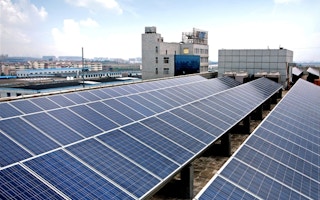Europe and the United States both said on Tuesday they were not holding coordinated talks to negotiate an end to a trade dispute with China over the dumping of solar panels onto their respective markets.
The European Union has until June 5 to decide whether to impose duties averaging 47 per cent on Chinese manufactured solar panels. The United States has already imposed duties of about 30 per cent on Chinese manufacturers.
“We do not have a common battle plan. We have not discussed it,” the EU’s trade commissioner, Karel De Gucht, told a meeting in New York sponsored by the European American Chamber of Commerce and the State University of New York. “We have not teamed up. We have not done so.”
Both De Gucht and the US Trade Representatives office were responding to a New York Times report that said the United States and the European Union have each decided to negotiate settlements with China to resolve anti-dumping and countervailing duty cases against Chinese solar products.
News of the report initially sent Chinese solar stocks sharply higher, though some later pared gains.
The US Trade Representative’s office said in an emailed statement that there were no “active” negotiations under way with the EU and China on solar panels, though the statement did not rule out the idea.
“Our goal is to support a healthy global solar industry in conditions that foster the adoption of renewable energy and continued innovation and a level playing field for all,” USTR spokeswoman Carol Guthrie said in the statement.
“Toward those ends, we will continue to work with industry and our trading partners to explore ways to resolve concerns. Active negotiations have not yet begun,” she said.
In a similar vein, De Gucht, in response to a question from Reuters, said, “We have a similar problem, but there are no templates for finding equitable solutions. We have not had consultations yet between us on this matter.”
The European Commission agreed earlier this month to impose punitive import duties on solar panels from China. However, the formal declaration of duties only comes if it is published in the EU’s Official Journal on June 6.
Shares of JA Solar Holdings Co Ltd were up 4 per cent in afternoon trade, while LDK Solar Co Ltd rose 10.9 per cent. China Sunergy Co Ltd eased off earlier highs to trade up 0.8 per cent, while Trina Solar Ltd was up 9.6 per cent and US-based First Solar Inc gained 1.2 2 per cent.
Europe’s argument with China over solar panels is but one of 18 ongoing trade investigations with Beijing.
Most recently, De Gucht warned that the EU was ready to launch a dispute over telecom networking equipment makers. On Friday he specifically named China’s Huawei and ZTE Corp for violating anti-dumping and anti-subsidy guidelines in an interview with Reuters.
De Gucht, who spoke before the Council on Foreign Relations in New York on Tuesday, was asked if China should be uneasy given that its two biggest trading partners are about to start trade talks.
“There is no reason that they should be nervous,” he said, adding, “I believe this agreement (with the US) will contribute to a global level playing field. This should also be the aim of China.”
The EU and United States account for nearly half the world’s economic output and 30 percent of trade, with goods and services worth $2.7 billion traded bilaterally every day. Those figures were released in February when the two sides announced they would launch bilateral trade talks.
The EU is China’s most important trading partner, while for the EU, China is second only to the United States. Chinese exports of goods to the 27-member bloc totaled 290 billion euros ($374 billion) last year, with 144 billion euros going the other way.
“They have now become an important economy and they have to take up global responsibility … for a global playing field,” said De Gucht.
“There is no ambition whatsoever and we will do everything to avoid that China would feel cornered, but on the other hand we ask them to take up more responsibility for the global economy.”










